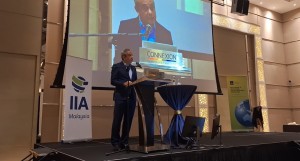NILAI – Universiti Sains Islam Malaysia (USIM), through the Faculty of Economics and Muamalat (FEM), has once again received recognition from the Malaysian Institute of Accountants (MIA) when a policy paper titled “White Paper on Shariah Audit” was launched by Datuk Bazlan Osman, the President of MIA, during the Audit Committee Conference 2023 held recently at The Vertical, Bangsar South, Kuala Lumpur.
The policy paper is the result of research conducted by a team of researchers from FEM, led by Prof. Dr. Zurina Shafii and comprised of Prof. Dato’ Dr. Mustafa Mohd Hanefah, Dr. Muhammad Iqmal Hisham Kamaruddin, Dr. Supiah Salleh, and Dr. Nurazalia Zakaria.
This policy paper emphasizes the importance of Shariah compliance processes for Islamic financial services and products, focusing on implementing Shariah governance structures and robust audit practices. Additionally, the policy paper aims to provide an overview of current regulations and practices, as well as issues and policy recommendations related to Shariah audit in Shariah-based institutions in Malaysia.
The collaboration between the research teams of FEM USIM and MIA about Shariah audit research began in 2020 under a matching grant scheme. This research aimed to identify current practices in Shariah audit within Shariah-based institutions in Malaysia. This included the Islamic financial sector, Islamic capital market sector, Islamic cooperative sector, public sector Shariah-based institutions, and public trust entities.
In obtaining feedback from the involved Shariah-based institutions, a total of 124 stakeholders from Shariah-based institutions were engaged through five roundtable discussions (RTD). The Islamic financial sector RTD involved:
- 16 representatives from eight Islamic banks.
- Four representatives from takaful institutions.
- Representatives from the Central Bank of Malaysia (BNM).
Meanwhile, RTD’s Islamic capital market sector involved:
- 17 representatives from two Islamic Real Estate Investment Trust (i-REIT) companies,
- three Islamic brokerage firms.
- one crowdfunding platform.
- eight Islamic fund management companies, and representatives from the Securities Commission (SC).
For the Islamic cooperative sector RTD, 49 representatives participated, including two cooperative banks, five credit cooperatives, one agricultural cooperative, 12 consumer affairs cooperatives, and five service cooperatives, along with representatives from the Malaysia Cooperative Societies Commission of Malaysia (SKM) and the Cooperative Institute of Malaysia (CIM).
Furth ermore, for the public sector Shariah-based institution RTD, 38 representatives from 17 institutions were involved. This included representatives from four zakat institutions, four wakaf institutions, seven State Islamic Religious Councils (MAIN), as well as representatives from the Department of Awqaf, Zakat, and Hajj (JAWHAR).
ermore, for the public sector Shariah-based institution RTD, 38 representatives from 17 institutions were involved. This included representatives from four zakat institutions, four wakaf institutions, seven State Islamic Religious Councils (MAIN), as well as representatives from the Department of Awqaf, Zakat, and Hajj (JAWHAR).
Finally, the RTD for public trust entities involved four representatives from two public trust-based entities, Tabung Haji (TH) and Yayasan Pembangunan Ekonomi Islam Malaysia (YaPEIM).
According to Datuk Bazlan Osman, the President of MIA, the eagerly awaited launch of this policy paper is mainly due to the current need for addressing Shariah audit assurance. He also mentioned that this policy paper should serve as a reference, especially for publicly listed companies and public trust entities with Shariah Committees, to strengthen Shariah governance.
Prof. Dr. Zurina, the lead researcher, stated that the launch of this policy paper by MIA signifies recognition of USIM’s expertise, particularly within FEM, as it was entrusted with conducting research on Shariah audit in Malaysia. This also demonstrates that apart from producing accounting graduates recognized by MIA, FEM is also acknowledged for having academic experts conducting research on accounting standards, especially for Shariah audit in Malaysia.
The launch of this policy paper is expected to benefit stakeholders, particularly industry players in Shariah-based institutions, in implementing effective governance and Shariah assurance to ensure the sustainability and compliance with Shariah principles by these institutions, thereby enhancing accountability levels.
sources: Dr Muhammad Iqmal Hisham Kamaruddin

